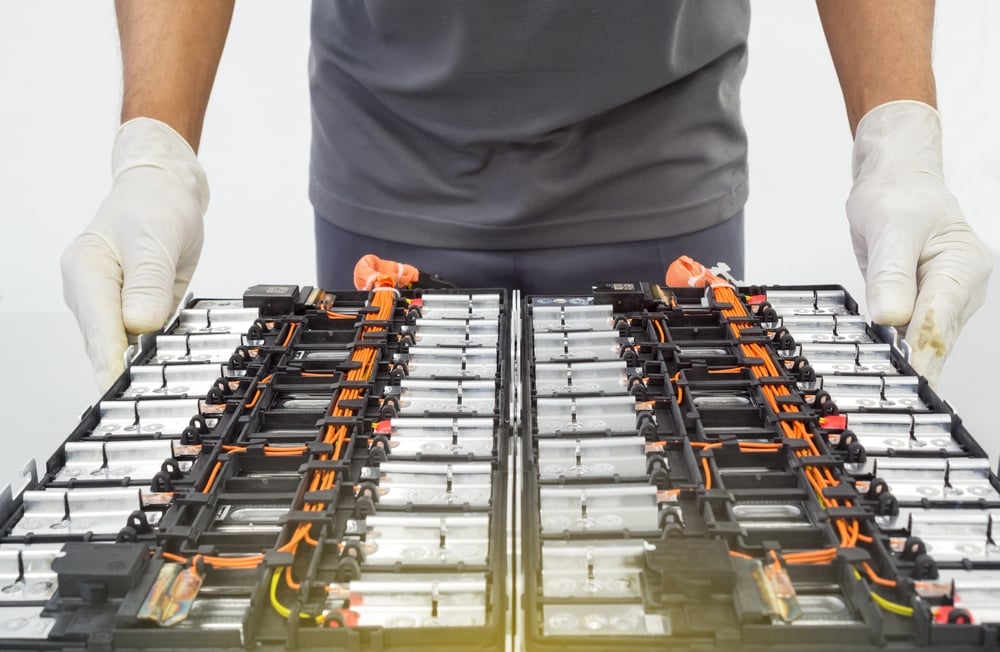
To address the elephant in the room: yes, electric car batteries are recyclable, with some techniques allowing up to 95% of the raw materials to be recovered. Governments globally are also mandating EV batteries to be designed and manufactured in an easily recyclable way.
Beyond recycling, EV batteries can be upcycled, reused, or repurposed after they have outlived their long initial life in your car.
Addressing concerns: The durability of electric car batteries
Electric mobility is undoubtedly becoming the new norm, with electric vehicle (EV) sales breaking records every year. But EVs are not without their critics – there has been much debate about how sustainable electric vehicles (EVs) really are, and their batteries are usually the main culprit.
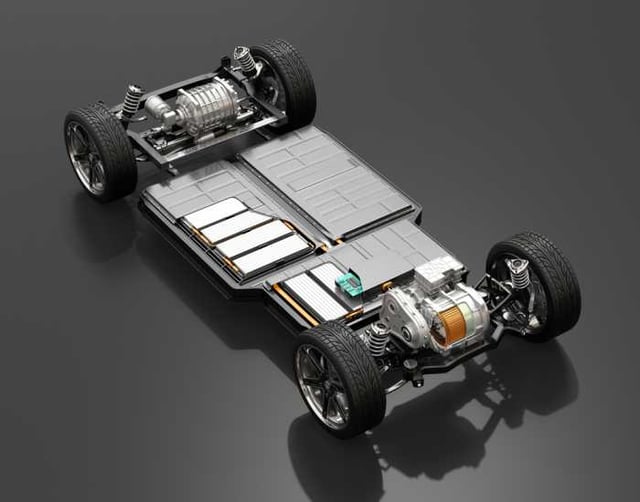 The concern is understandable: we’re all too familiar with the batteries in our phones and laptops losing much of their capacity within a few years – or even worse, outright failing prematurely.
The concern is understandable: we’re all too familiar with the batteries in our phones and laptops losing much of their capacity within a few years – or even worse, outright failing prematurely.
Unlike the batteries in our devices, EV batteries are designed from the ground up for durable, high-intensity performance. As a result, they usually last much longer, 15-20 years on average.
But even the most durable battery will eventually reach the end of its useful life. So, what can be done with used EV batteries? We’ll explain below the recycling processes, but also how EV batteries can be upcycled, reused, or repurposed.
Let’s explore what happens to EV batteries after you’re done using them.
How long is the battery life of an EV?
Before even thinking of recycling, one of the main concerns people have about electric cars is their battery life. Our research found that 30 percent of potential EV drivers worry that their car’s battery will die before they’re done using it.
This fear, however, is mostly unwarranted. Currently, a new battery is expected to last between 100,000 to 200,000 miles or about 15 to 20 years of driving. But beyond a hypothetical expectation, EVs produced a few years ago have shown that their battery can last well past the average lifespan of a car.

Tesla, for example, reports that their batteries are typically used for around 200,000 miles in the US and 150,000 miles in Europe without issues. But even if a battery does fail prematurely, manufacturers usually include an 8 to 10-year warranty, so it will be covered for most of its life.
Like other electronics, EV batteries will eventually lose some of their maximum capacity with use. That said, the loss is minimal, only about 2.3 percent per year, and there are ways to extend your car’s battery life – for instance, not charging every night or only charging up to 80 percent.
EV Batteries, what are they made of?
While EV batteries will last for years, they will eventually reach their end of life. To understand how an EV battery can be recycled, we first need to look at what it is made of.
Like other electronics, EV batteries rely mainly on rechargeable lithium-ion cells to store energy. Beyond lithium, commonly used materials include cobalt, manganese, nickel, and graphite, as well as steel and aluminum for the casing.
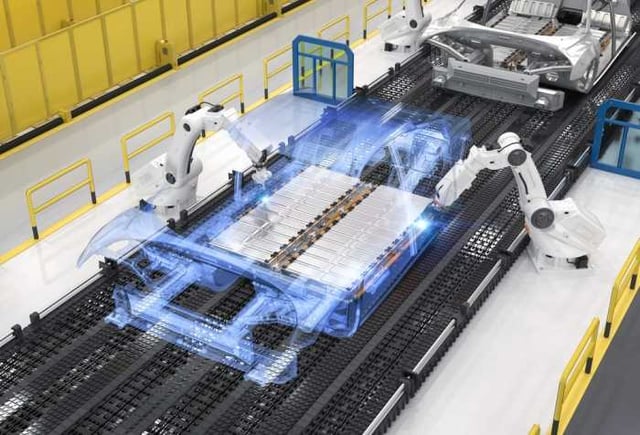
To be recycled properly, these materials must be separated and purified to a point where they can be reused.
Beyond the Car: The future of end-of-life EV Batteries
As with most products, an EV battery is more sustainable the longer it can be used. While recycling allows the raw materials to be recovered, it’s still an energy-intensive process and should be the last resort when a battery can no longer be used in any other way.
Luckily, there are ways to upcycle and reuse old EV batteries, with even more potential for future applications. Nissan, for example, has found that its old EV batteries retained around 60 to 70 percent of their original capacity after the car had been scrapped. While that might not be enough to power an EV, it is perfectly suited to many less energy-intensive uses.
One of the most popular applications for old EV batteries is for electricity storage, whether at the grid level or for individual homes and businesses. For instance, a project by Eaton, BAM, and our partner: The Mobility House, uses 148 old Nissan Leaf batteries to create a 3-megawatt battery storage that can smooth out peaks in demand at Amsterdam’s Johan Cruijff ArenA.

As renewable energy storage becomes a key challenge for grids across the world, storage systems made from used EV batteries can be a promising application that gives old batteries a second life.
Electric Car Batteries: A Look into their recyclability
While repurposing old batteries is usually the best solution, sometimes, batteries are defective or no longer functional enough to be reused. In these cases, recycling is the best option.

Recycling lithium-ion batteries is increasingly becoming a priority for countries and companies trying to reduce their dependency on raw material mining. Because many of the materials in EV batteries are rare or hard to source, recycling can ensure these valuable materials aren’t lost to landfills and instead fed back to the supply chain. Let’s see in more detail how EV battery recycling works.
How does recycling an EV Battery work?
To separate the various elements that make up an EV battery, it is first shredded, and the resulting materials are filtered based on size and composition. This separates plastics, ferrous materials (metals), and non-ferrous materials.
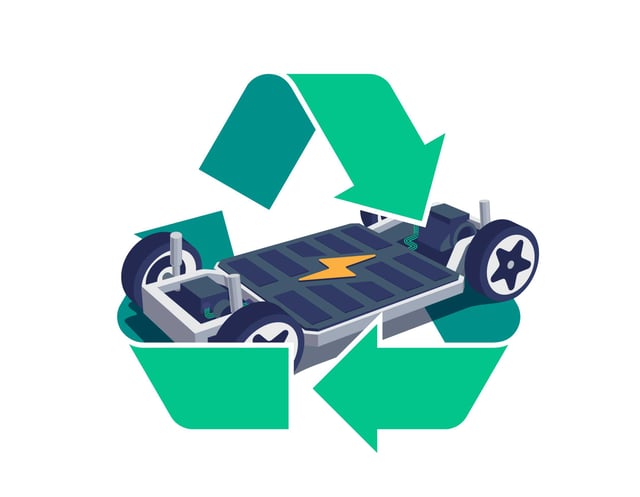
The next step is to extract valuable materials, such as lithium, cobalt, nickel, and manganese. This can either be done by applying high heat to the materials in a process called pyrometallurgy, which burns away non-metal parts, or by exposing the mix to chemical solutions that recover the appropriate materials, using a technique called hydrometallurgy.

While recycling techniques vary, this process can recover up to 95% of the key raw materials from an EV battery pack and feed them back into the battery manufacturing supply chain.
Is recycling an EV battery Safe?
Thankfully, there are increasingly stringent regulations around EV battery recycling across the world. The EU already requires that EV batteries be at least 50 percent recyclable by weight, which will increase to 65 percent by 2025.

In the US, local governments have authority over EV battery disposal and recycling, so regulations vary between states. California, for example, created the California Battery Recycling Advisory Group, which consists of automotive and battery manufacturers, government agencies, and public interest groups and is tasked with recommending policies for EV battery recycling.
What are the benefits of recycling electric car batteries?
As we’ve seen, EV batteries are made of many rare, hard-to-source materials, which are often concentrated in regions with poor human rights and environmental records. Recycling can help reduce the need for new raw materials, moving away from unethical and problematic supply chains.
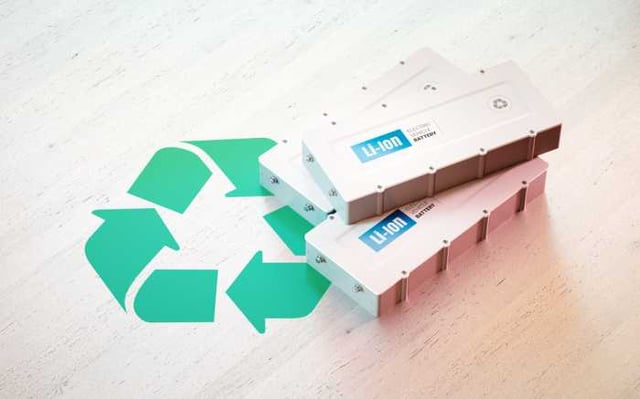
Recycling also helps preserve the environment. For one, recycling a battery, while still energy-intensive, uses much less energy than creating one from scratch. Second, recycling a battery prevents it from ending up in a landfill, where its components can leach into groundwater and pollute the drinking water supply.
Electric car batteries and the circular economy
As the number of EVs on the road will keep growing exponentially, considering their batteries’ end-of-life is essential to ensure electric cars are as sustainable as they are.
Recycling can help recover a significant portion of the materials used and put them back in the battery supply chain to create a truly circular economy. Beyond recycling, there are several ways to reuse and upcycle old EV batteries, prolonging their useful life.
If you’re wondering how sustainable electric cars really are, from their manufacturing to their use and end of life, check out our dedicated article on the topic.
Related articles

Smart Charging for Solar EV Systems: What is possible today?
There are a variety of smart solutions available, capable of optimizing your solar EV charging system in different...

Can solar EV charging save you money?
Charging your EV using household solar panels can indeed save you money on your utility bills. How much money solar EV...

How to optimize your solar set-up for charging electric cars at home
There are several ways EV drivers can optimize a homegrown solar system to ensure their EV recharging needs are met....